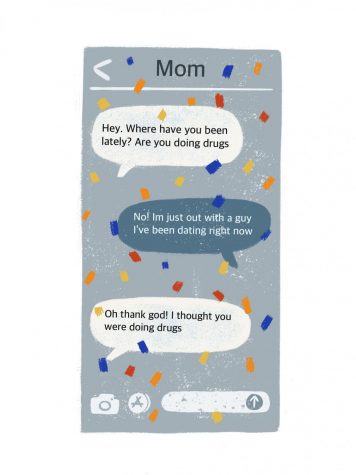OPINION: Being an LGBTQ advocate without coming out
April 19, 2019
“Thank god, I thought you were doing drugs” was my mother’s response when I texted her I was out with a guy I was dating. I hadn’t really thought about it as coming out, but technically that was the first time I told her. After growing up transgender, coming out as gay didn’t seem like something I needed to make a big deal out of. I was incredibly fortunate to be surrounded by such positive LGBTQ role models and peers. It was a seamless transition.
In October 2018, I accepted a summer job to be a videographer at a boys’ summer camp in rural North Carolina. The camp “caters to the most conservative of families.” Reading that from my future boss, I knew I would be entering an environment that was drastically different. I also knew I had to make a choice: Do I come out or stay in the closet? If I stay in the closet, am I doing my part to advocate for my community? Am I secretly ashamed to be transgender and gay

According to a June 2018 Human Rights Campaign survey, 46% of LGBTQ employees reported remaining closeted at work. According to Out and Equal, a nonprofit organization dedicated to workplace equality, more than three-quarters of transgender employees take steps to avoid mistreatment in the workplace. As a kid, I was used to keeping my past gender identity a secret, both at school and in my everyday life. I had become so accustomed to rarely sharing that information about myself that I thought it wasn’t important to share now in my everyday life.
As I become more comfortable with my identity and sexuality, I want to do more for my community and act as an advocate. I’ve always been fortunate enough to blend into my surroundings, a privilege I now realize I can use as a tool to be an advocate, too.
According to the Human Rights Campaign, more than half of LGBTQ workers have reported hearing jokes about lesbian or gay people at work. Being around young impressionable boys, I anticipate the word “gay” will be thrown around as a derogatory term. If I make an effort to consistently stand up to this behavior, and educate them on the hurt that may follow that insult, they could see someone defending LGBTQ people for perhaps the first time.
The ripple effect can continue with my peers as well. The effectiveness of not coming out in order to actively advocate seems greater than telling them “I am gay, so you can’t say that.” That language alone puts anyone in an uncomfortable position. Being told to accept something different on the spot makes it hard for people to truly understand and accept.
In order to urge traditional thinkers to consider shifting their language and actions to be more accepting of diversity, one must consider how to effectively reach them first. Using language that implies they must unquestioningly accept something makes people feel forced. I plan on taking both sides into consideration in order to advocate for my community. Ignorance is often overlooked in our daily routine but when someone steps forward, it turns heads. Change can happen when introduced to the repetitive behavior of standing up for what one believes in. After enough time, people will take notice.







